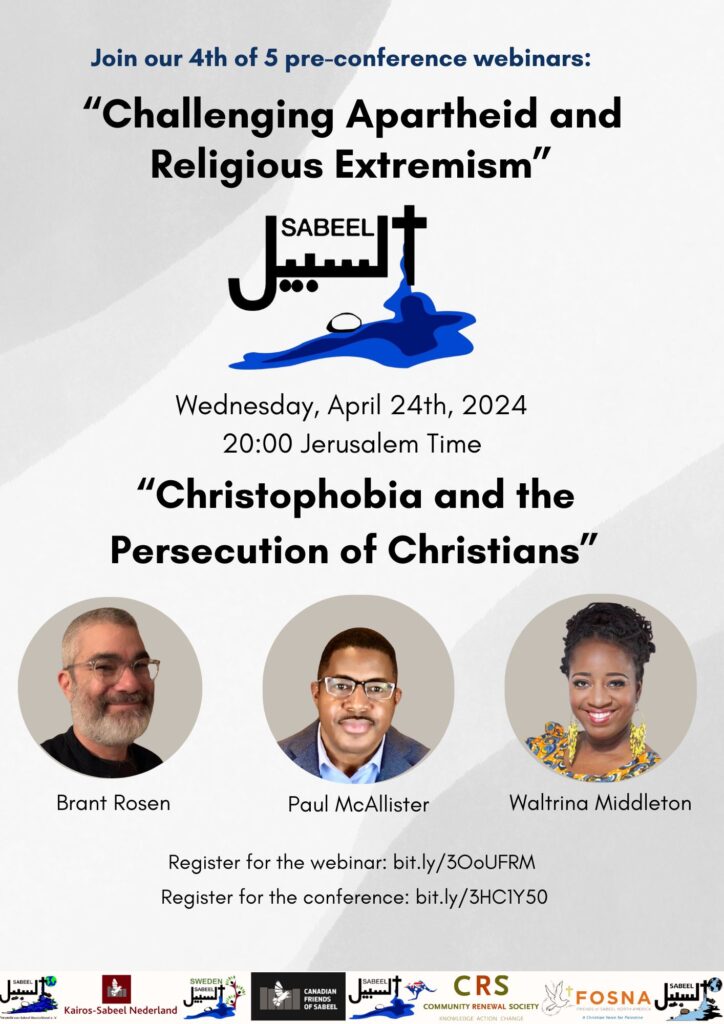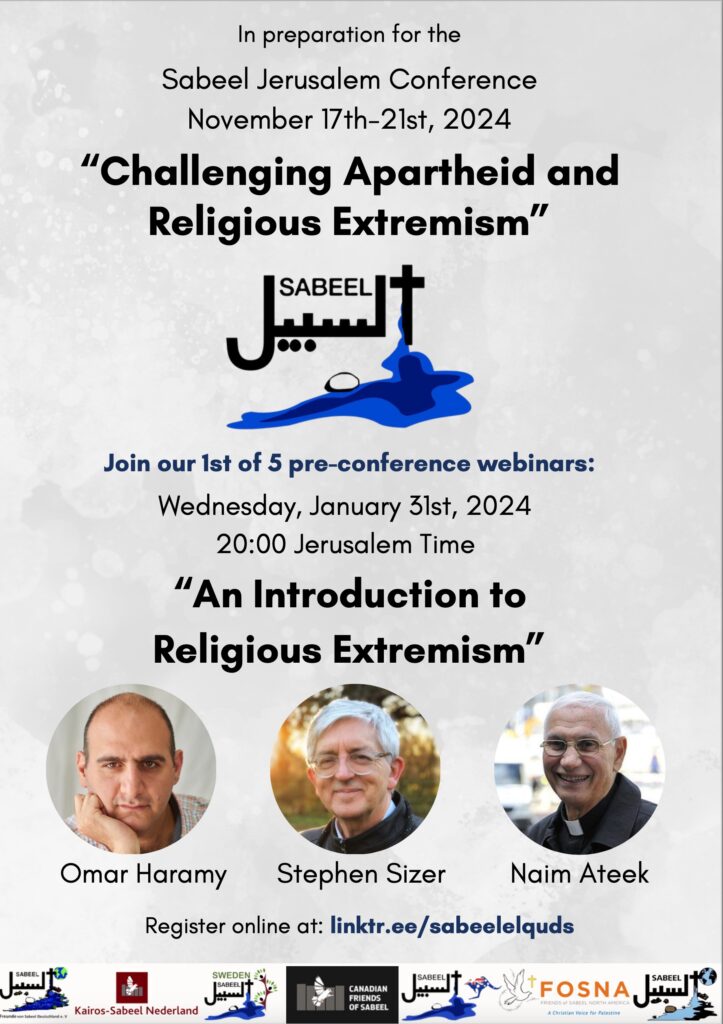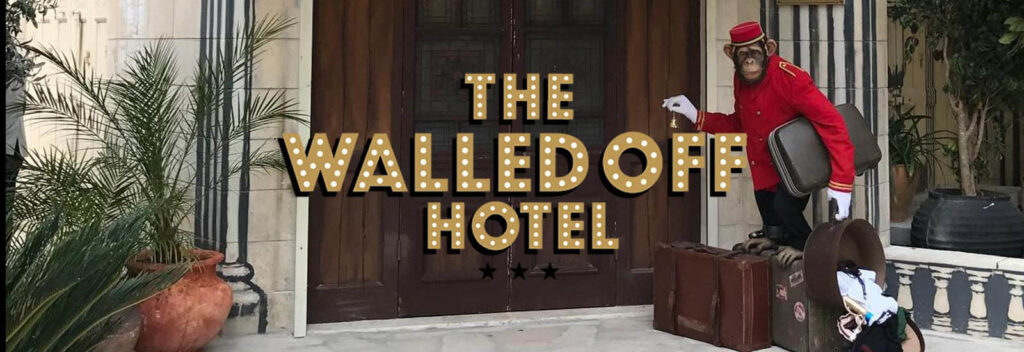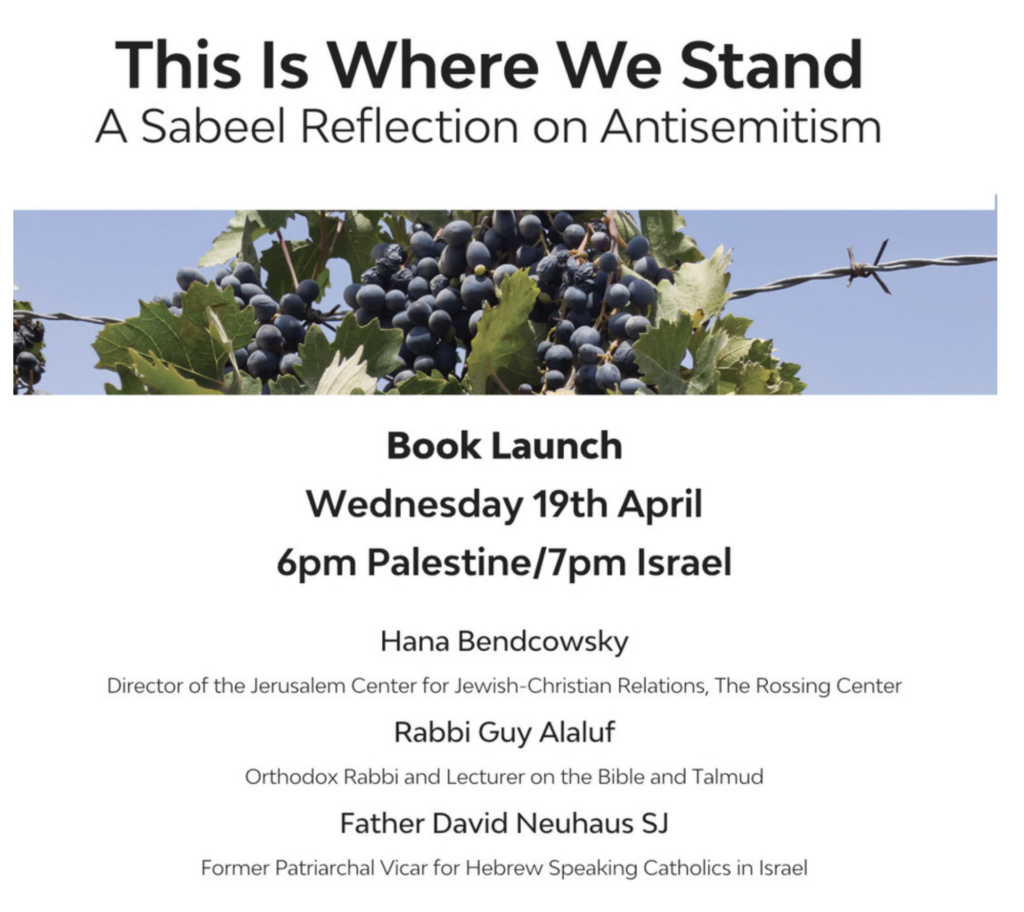
Challenging Religious Extremism: Christophobia




Conference Purpose Statement:
After ignoring 75 years of Israeli settler-colonial violence, since the 7th of October last year, the world has been shocked into taking notice of the genocide occurring against Palestinians in Gaza. With the aim of speaking into these tragedies, the 2024 Sabeel International Conference will challenge apartheid and religious extremism through a liberationist approach to theology by ecumenical and interfaith collaboration. Thought leaders representing the Abrahamic faiths will guide participants in reflecting on the current situation and exploring ecumenical, interfaith, non-violent avenues for fostering peace and justice in Palestine and Israel.
Webinars: Sabeel has organized five webinars, each at 8pm Jerusalem time, from January to May. These webinars, facilitated by distinguished academics and activists, serve as a prelude to the conference by introducing themes and topics that will be explored in depth in November.
Register for the webinars here
Wednesday 31st January: An Introduction to Religious Extremism
This webinar will introduce religious extremism and outline the November conference.
Wednesday 28th February: Zionism and Antisemitism
How the term antisemitism has been weaponised and an examination of the relationship between Zionism, apartheid, and religious extremism in Judaism.
Wednesday 27th March: Islam and Islamophobia
Define Islamophobia, challenge stereotypes and prejudice toward Muslims, and examine how Islamophobia has been exploited to silence criticism of Israel.
Wednesday 24th April: Christophobia and the Persecution of Christians
A discussion on the persecution of Christians and how Christian Zionism exacerbates tensions for Palestinian Christians.
Wednesday 29th May: A Summary on Religious Extremism
A summary of the series and information about the November conference including the schedule and how to maximize your participation.
Principles: The principles guiding this conference include facilitating constructive interfaith dialogue, promoting human rights and justice in Palestine and Israel, challenging misinterpretations of religious texts contributing to extremism, empowering grassroots activism and advocacy, and strengthening collaborative networks. The Sabeel conference aims to create a platform for dialogue across faiths to address the root causes of extremism and advance human rights in Palestine.
Register for the webinars here

My favorite hotel in all the world is the Walled Off in Bethlehem. Designed by Banksy, the anonymous British artist, it overlooks the Separation Wall. In bricks and mortar Banksy demonstrates how art can become an act of defiance against Israeli settler colonialism and apartheid. Tuesday this week, 29th August, was the anniversary of the assassination of Naji Al-Ali, the Palestinian political cartoonist and writer who drew the iconic image of the 10-year-old child Handala, which you often find drawn on the Apartheid Wall dividing the illegal Israeli colonies from the Palestinian ghettos. Appropriately therefore this week’s Kumi Now reflection, is entitled, ‘Art as Resistance’.
“Too often the Palestinian tragedy is portrayed as a humanitarian crisis rather than one that has to do with identity and self-determination. They believe art is a luxury that Palestinians cannot afford. That, instead, what they need is bread to eat, to fill their stomach, so they can think and live another day. But people “shall not live by bread alone” (Matthew 4:4). Art and culture instead feed the soul and allow it to thrive. It gives people the strength to refuse being on the receiving end, perceived as victims. It allows people to become actors instead of spectators. It gives them the long breath necessary to resist. For wherever there is occupation, there will be resistance. The question therefore is not whether to resist, but how to resist.”
Continue reading
You are invited to the online book launch
When: Apr 19, 2023 07:00 PM Jerusalem
Register in advance for this meeting:
After registering, you will receive a confirmation email containing information about joining the meeting.
 Twenty years in the writing, Canon Naim Ateek’s long awaited sequel to Justice only Justice, may prove to be the most important work ever written by a Palestinian theologian.
Twenty years in the writing, Canon Naim Ateek’s long awaited sequel to Justice only Justice, may prove to be the most important work ever written by a Palestinian theologian.
For those who know and respect Canon Ateek and the reconciliation work of the Sabeel Liberation Theology Centre in Jerusalem, the title says it all: A Palestinian Christian Cry for Reconciliation. He is unwavering in his conviction that “Our God-given mandate is to see that an enduring peace is achieved in the Middle East” (p. xiii). The book explains the reasons for the struggle for justice; the tortuously slow progress made in the last twenty years; why successive peace agreements have failed; and why reconciliation between Palestinians and Israelis is as elusive today as it was in 1948 or 1967. While brutally realistic, it is nevertheless a hopeful book, calling for justice for Palestinians, peace for Israelis and reconciliation for both.
The book has three parts. The first part is entitled, “Recapping History” and traces the birth of Sabeel, Canon Ateek’s own personal story, the generous offer of the Palestinians to share the land in a “two state solution” and the consistent refusal of Israel to abide by international law which has led to both political extremism and the breeding of violence. There is an extended exposition of the parable of the unjust judge (Luke 18) and some of Jesus’ harshest words against those who deprive others of justice (Matthew 23:25-26). With great care, Canon Ateek explains why successive peace negotiations failed because they failed to address the root cause of the conflict – Israel’s illegal occupation, annexation and colonisation of the West Bank. One of the most helpful sections refutes Zionist propaganda about the “generous offer” and shows how Palestinians have consistently been willing to compromise land for peace but to no avail.
The second part addresses Palestinian Liberation Theology in the service on nonviolence and peace. Here Canon Ateek examines the place of “Land” in Scripture and the centrality of the biblical demand for justice. He exposes the deficiencies and inherent racism of Zionist theology. There follows an examination of the theology and politics of Christian Zionism and he contrasts this with the non-violent way of the cross of Jesus. In successive chapters, Canon Ateek compares the strategies and paradigms of contemporary, historical and biblical figures such as Saddam Hussein, Jonah, Samson, Daniel and Judah Maccabeus.
The third and final part is appropriately entitled “The Peace we Dream of”. With sensitivity and compassion, Canon Ateek summarises Israel’s predicament – how to remain a Jewish State committed to ethnic nationalism without rightly being compared to apartheid South Africa. He identifies the deficiencies of the “Two State Solution” and need for Israelis and Palestinians to move from justice to forgiveness and reconciliation.
The foreword is written by Archbishop Desmond Tutu, and there are four appendixes dealing with the Zionist plan for Palestine from 1919, the infamous Balfour Declaration, Palestinian loss of land from 1946-2005, and the West Bank Barrier route as of June 2007.
Consistently throughout the book, Canon Ateek, seeks faith based solutions based on biblical models and scriptural injunctions “to do justice, love mercy and walk humbly with our God”. Canon Ateek shows compellingly that one cannot divorce religion from politics. Both are he insists “deeply intertwined” He insists “Religion can be a source of tremendous spiritual strength, but religion, when misused and translated into action by people of power, can also become a deadly weapon.” (p. xiv).
It is clear why to many Zionists, Canon Ateek and other Palestinians who have disavowed violence as a means of achieving independence, are a greater threat than the terrorists. (see Camera and CUFI for examples)
In this vitally important book, Canon Ateek identifies the major principles or building blocks upon which a just and lasting peace can and must be built. Canon Ateek strikes at the heart of the conflict and fearlessly addresses the major obstacles to peace, not least the unconditional support successive US administrations have afforded Israel. Canon Ateek warns prophetically, “Only when justice is done and Palestinians can celebrate their own independence will a comprehensive peace be felt throughout the land. As long as one side celebrates while the other mourns, no authentic celebration or peace is possible.” As Jesus says, “Now that you know these things you will be blessed if you do them.” (John 13:17)
Some Reviews:
“This is one of those books that are capable of transforming the reader and can change the world” Walter Wink.
“An important book for understanding the deeper issues impacting the path to peace for the people of Palestine and Israel. The concrete course of action Fr. Ateek proposes is rooted in non-violence, grounded in current realities, and can finally open a clear path to justice, reconciliation, and forgiveness for all the peoples of the Holy Land” Dave Robinson, Pax Christi USA.
“This book… is essential reading for anyone committed to the non-violent struggle for justice and peace in the Middle East” John H. Thomas, President, United Church of Christ.
“Ateek’s vision is three-fold: the unity of all Palestinian Christians, dialogue and solidarity between Christian and Muslim Palestinians, and the creation of justice and peace between Israelis and Palestinians. It demands dismantling those theologies and readings of the Bible that turn God into a racist God of war who chooses one people over others…” Rosemary Radford Ruether, Pacific School of Religion.
“Naim Ateek offers a welcome contribution to the struggle that so many share for peace, justice and reconciliation in Israel and Palestine. His new book is an important reminder of the unique role that Palestinian Christians… can and should play in resolving one of the most painful situations of injustice and violence in our world today. I share its dream of a Holy Land that truly is a land of peace, justice and reconciliation.” Clifton Kirkpatrick, President, World Alliance of Reformed Churches.
The Revd Dr Naim Stifan Ateek, a Palestinian Anglican priest, is an Arab citizen of Israel. He is the president and director of Sabeel, an ecumenical theological centre in Jerusalem, which he founded to work for the liberation of Palestinians. For more information see the Friends of Sabeel North America and Friends of Sabeel UK.